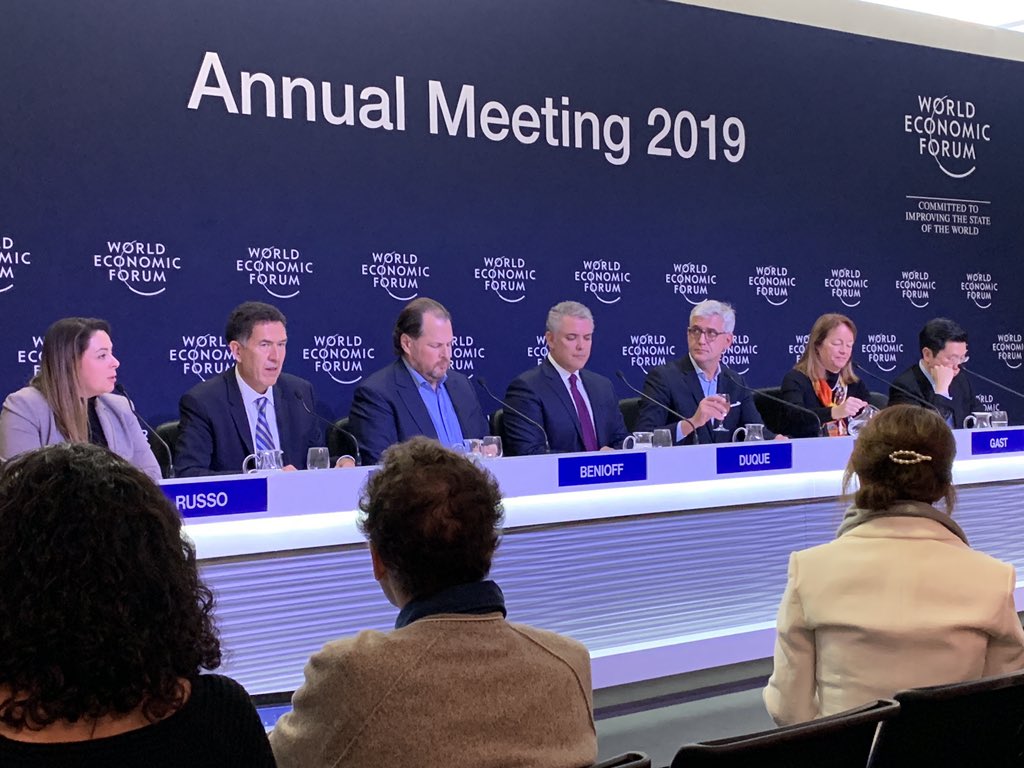Tech and political leaders sounded the alarm bell today about the potential for artificial intelligence to exacerbate huge inequalities across the world. The mood music coming out of the World Economic Forum is that AI is seen as having great potential to solve some of the world’s most pressing issues (such as climate change), but if individual organizations and countries implement AI systems and others do not, then they will race far ahead, spreading inequality between economies and leading to unforeseen consequences for the planet.
Speaking at the World Economic Forum in Davos, Switzerland, the president of Colombia (Iván Duque Márquez), Marc Benioff (chairman and co-CEO of Salesforce) and Kai-Fu Lee (the Chinese venture capitalist, and an artificial intelligence expert) backed a new WEF initiative to expand its network of “Centres for the Fourth Industrial Revolution” to Columbia and other emerging economies. Joining Columbia will be Israel and the UAE, and other affiliate centres are planned.
The Centre for the Fourth Industrial Revolution (C4IR) was created by the WEF as a hub for “global, multistakeholder cooperation to develop policy frameworks and advance collaborations that accelerate the benefits of science and technology.” But in particular, it has a focus on how rapidly and equally advanced technologies are spread across the world.
One of the problems with the spread of high tech is that government policies governing emerging technologies can be incredibly piecemeal, with some areas becoming regulated heavily, and others hardly at all.
When it comes to the spread of AI, which could have exponential effects on companies and economies, the resulting inequalities would be a sort of “weaponization” of the space, the WEF argues.
Benioff himself has championed the creation of the C4IR in San Francisco, being as it is at the epicenter of many of the greatest advances in technology. But he’s also acutely aware that the city is grappling with huge inequalities between those who’ve benefited from the march of technology and those who have been almost entirely let behind. During the WEF this year, he called San Francisco a “train wreck” of inequality because of Silicon Valley.
“The fourth industrial revolution, it’s an extraordinary moment in history,” he said. “The fourth industrial revolution holds great promise in the creation of new jobs, new ways to cure disease and relieve suffering. But on the other hand there’s a risk that it will worsen our economic, racial, gender and even our environmental inequalities. This can be seen with AI. We are risking a new tech divide between those who have access to AI and those who do not. I strongly believe that AI is going to be a new human right. Every person and every country needs to have access to this new critical technology.”
He continued: “Today, only a few countries and companies have access to the best AI in the world. And those who have it will be smarter, healthier, richer and of course, their warfare will be significantly more advanced. That is why it’s critical that we ask the equation now, especially in regards to equality. What are we doing to really bring these technologies to everyone? Those without AI will be less educated, weaker, poorer and sicker. So we must ask ourselves, is this the kind of world want to live in?”
He then went on to reference the obvious inequalities in San Francisco. “We also have a tremendous crisis of trust in the misuse of data and privacy,” he said.
“We are in a crisis of trust in the industry. The ‘techlash’ has never been bigger. We’re at the tip of the spear [in San Francisco], we are in a great place [to study tech]. We are a little big in the future.”
His view is that the WEF’s network of Centres for the Fourth Industrial Revolution will help address how companies and governments can apply hi-tech like AI across society and economies.
Benioff said technology is neither good nor bad itself but it’s “what we do with it matters … We can see our planet is in crisis. By 2050 we will have an ocean with more plastic than fish, according to the WEF… all of these issues could be addressed through ‘fourth industry revolution technology.’ ” He praised the WEF for launching this new center in Columbia.
Dr. Kai-Fu Lee, the chair of the WEF’s global AI council, said: “Various consulting firms have estimated that AI could create 13-17 trillion dollars of incremental GDP in the next 11 years. And every country is now producing an AI plan.” But, he said, AI will have profound effects on jobs, privacy and security. “We hope to be a center that considers many viewpoints. We have to recognize that the attitudes and visions for AI across countries and regions may be different and we have to find a way to work together. A simple catch-all approach simply will not work. The unique advantage of the WEF is that it was born out of inclusiveness. We’re not here to impose western or indeed eastern values onto the whole world.” He said bringing together nations to work on AI would create a better approach to the application of AI globally.
For Lee the race for AI was “moving too quickly and many people misunderstand it. It’s creating tension between countries.” So we need a “transparent discussion.”































Comment